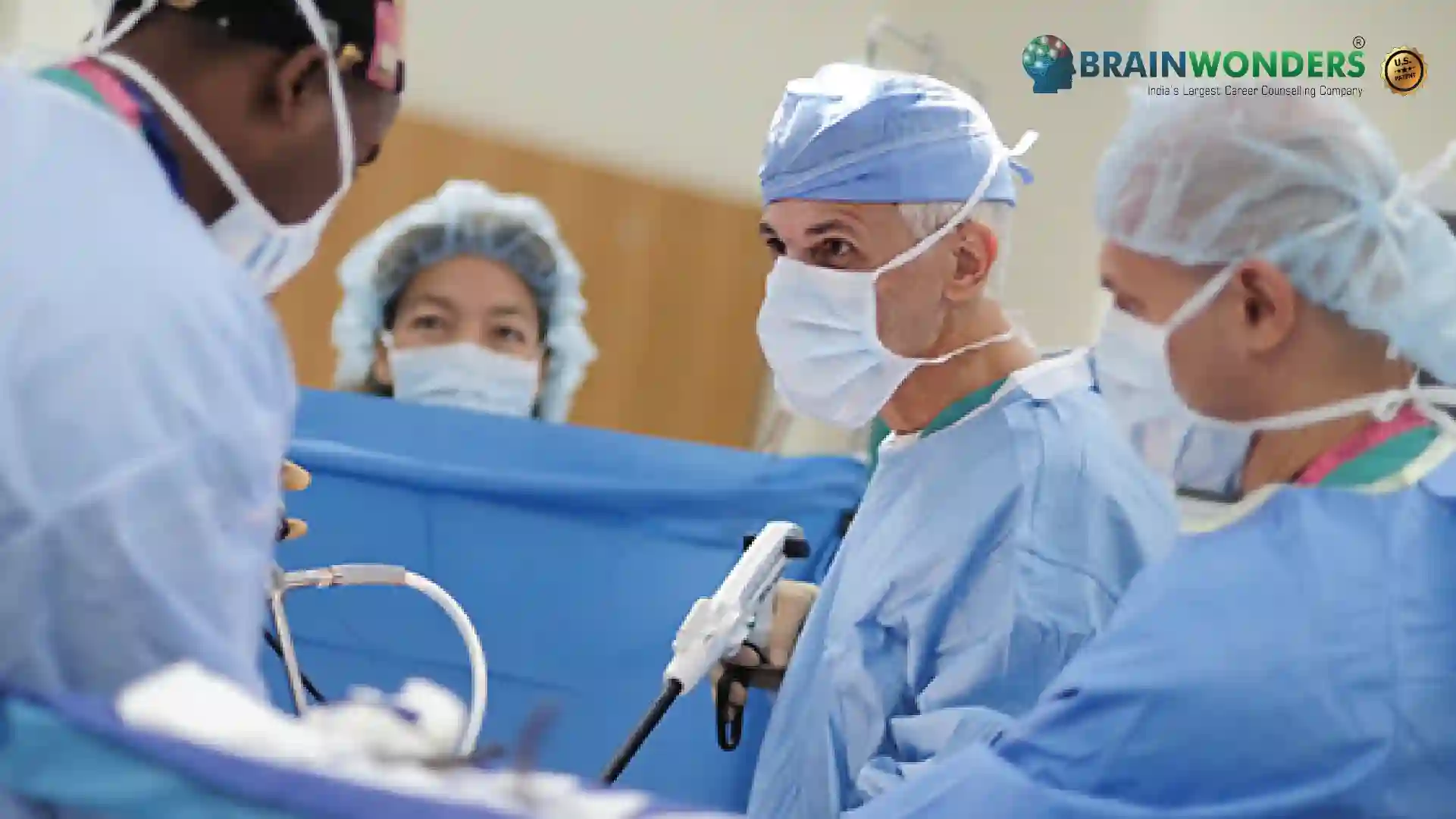How to become a Medical Oncologist / Surgical Oncologist
Overview, Courses, Exam, Colleges, Pathways, Salary

Overview
Who is Medical Oncologist / Surgical Oncologist ?
The study of cancer is termed oncology and oncologists are considered to be those specializing in this area. Oncologist meaning a physician who specialized in the diagnosis and treatment of can through chemotherapy, hormone therapy, biological therapy and targeted therapy. The main healthcare provider for anybody suffering from cancer is found in the oncology department with the exponential growth in cancer patients and fewer cancer specialists, a huge demand is observed in this specialized domain.
Oncologists are of different types. A medical oncologist meaning someone who uses chemotherapy or other drugs to treat cancer, such as radiation therapy or immunotherapy. On the other hand, a surgical oncologist removes the affected region by surgery, and a radiation oncologist treats with radiotherapy wherever necessary.
Typical day at work
What does Medical Oncologist / Surgical Oncologist do?
Job description, Profiles, Roles and Duties:
- Take medical history of the patients
- Update the patient information and charts to show current findings and treatments
- Drug prescription to suppress cancer cells
- Request assessments to carry out for nurses or other health care staff
- Review the results of the test to identify any abnormal results
- Recommend and draft a care plan
- Address apprehensions or respond to any queries that patients may have about their health and well-being
- Assist patients to take care of their health by talking to them about maintaining proper nutrition and hygiene
- Explaining the stage and the cancer diagnosis
- Discussing all treatment choices and his/ her preferred choice
- Providing quality and compassionate care
- Help a patient control the signs and side effects of cancer and its treatment
- Suggest medicines to block cancer cell growth and progression
- Block the effects of hormones that cancer cells use to expand and evolve
- Therapeutic administration of chemotherapy
Abilities and Aptitude needed
What are the skills, abilities & aptitude needed to become Medical Oncologist / Surgical Oncologist?
Teamwork is very important, as most oncologists collaborate with multidisciplinary teams of speciality nurses, radiographers, physicists, surgeons and other clinicians, all of whom need to integrate and communicate effectively. Good record keeping and other management skills in medical environments are important too.
As cancer is a life-threatening illness, those who wish to make a career as an oncologist ought to be sincerely involved with patients should have strong communication skills to address their issues and give them treatment, management of patients and work in teams.
Medical oncologists may work for long times with patients requiring special care. Extra patience may be essential for patients who are afraid of medical treatment. Medical oncologists must monitor and record various pieces of information about patient care accurately so that patients receive appropriate treatment and medication.
Oncologist meaning someone who needs to have the drive to create and introduce new therapies and treatments. Above all, a professional medical oncologist must have empathy and compassion for patients dealing with what may be a troubling and alarming diagnosis.
Salary
Salary for Medical Oncologist / Surgical Oncologist?
Salary of a Medical Oncologist / Surgical Oncologist is as follows :
- Minimum Monthly Salary (Medical Oncologist): Entry-level Medical Oncologists in India can expect a monthly salary ranging from approximately INR 1,00,000 to INR 1,50,000, especially at the beginning of their careers or when working in smaller healthcare facilities.
- Maximum Monthly Salary (Medical Oncologist): Experienced and highly specialized Medical Oncologists, particularly those practising in renowned cancer treatment centres, holding advanced degrees, or with extensive research contributions, have the potential to earn a maximum monthly salary of INR 3,00,000 to INR 5,00,000 or more.
- Annual Salary (Medical Oncologist): The annual salary of a Medical Oncologist varies based on factors such as experience, expertise in treating specific types of cancer, affiliations with prestigious medical institutions, and involvement in clinical trials. Annual earnings may range from INR 12,00,000 to INR 60,00,000 or higher for established professionals.
- Minimum Monthly Salary (Surgical Oncologist): Entry-level Surgical Oncologists in India can expect a monthly salary ranging from approximately INR 1,20,000 to INR 1,80,000, especially at the initial stages of their careers or when working in smaller healthcare facilities.
- Maximum Monthly Salary (Surgical Oncologist): Experienced and highly skilled Surgical Oncologists, particularly those performing complex procedures, leading surgical teams, or practising in renowned cancer centres, have the potential to earn a maximum monthly salary of INR 3,50,000 to INR 6,00,000 or more.
- Annual Salary (Surgical Oncologist): The annual salary of a Surgical Oncologist varies based on factors such as experience, expertise in specific surgical techniques, affiliation with top medical institutions, and contributions to advancing surgical practices. Annual earnings may range from INR 14,40,000 to INR 72,00,000 or higher for established professionals.
- Highest Paying Job and Scope: Medical Oncologists and Surgical Oncologists specializing in high-demand areas, such as rare cancers, precision medicine, or targeted therapies, often secure higher-paying positions due to their specialized skills. Professionals with advanced degrees (MD/DM in Oncology for Medical Oncologists, MS/MCh in Surgical Oncology for Surgical Oncologists) and a track record of successful patient outcomes may experience enhanced earning potential. The scope for Medical Oncologists and Surgical Oncologists is promising as cancer remains a significant healthcare challenge, and advancements in cancer treatments and surgical techniques continue to evolve. With the increasing prevalence of cancer and the growing demand for comprehensive cancer care, skilled Oncologists are crucial for improving patient survival rates, enhancing quality of life, and contributing to innovative cancer research. This dynamic field offers substantial opportunities for career growth, specialization, and making a meaningful impact on patient's lives and the field of oncology.
Pathways
How to become an Medical Oncologist / Surgical Oncologist?
Entrance Exam
Entrance Exam for Medical Oncologist / Surgical Oncologist ?
Courses
Which course I can pursue?
Best Colleges
Which are the best colleges to attend to become an Medical Oncologist / Surgical Oncologist?
Industries
Which Industries are open for Medical Oncologist / Surgical Oncologist?
Medical Oncologists and Surgical Oncologists are specialized physicians who play crucial roles in diagnosing, treating, and managing cancer patients. They work across various industries within the healthcare sector to provide comprehensive care and improve patient outcomes. Some of the industries open for Medical Oncologists and Surgical Oncologists include:
- Hospitals and Medical Centers: Medical Oncologists and Surgical Oncologists are core members of cancer treatment teams in hospitals, providing a wide range of cancer care services, including chemotherapy, radiation therapy, and surgical interventions.
- Cancer Centers: Comprehensive cancer centres, both academic and private, offer specialized oncology care, cutting-edge treatments, and clinical trials, providing opportunities for oncologists to work in a dedicated cancer care environment.
- Academic and Research Institutions: Medical Oncologists often conduct clinical research and trials to develop and refine cancer treatment protocols. They may also teach and mentor medical students, residents, and fellows.
- Private Practices and Group Practices: Many Medical Oncologists and Surgical Oncologists work in private practice or group settings, offering specialized cancer care to patients in community settings.
- Surgical Centers: Surgical Oncologists perform cancer-related surgeries in surgical centres, collaborating with other oncology specialists to deliver comprehensive care.
- Cancer Research Organizations: Oncologists may work with organizations focused on cancer prevention, treatment, and innovative therapies.
- Pharmaceutical and Biotechnology Companies: Some oncologists contribute to clinical research, drug development, and medical affairs teams within pharmaceutical and biotech companies.
- Teaching and Academia: Medical Oncologists and Surgical Oncologists can pursue careers in medical education, teaching and training the next generation of oncology professionals.
- Government and Public Health: Oncologists may work in government agencies or public health organizations to contribute to cancer prevention, screening programs, and policy development.
- Nonprofit and Advocacy Organizations: Oncologists may collaborate with organizations focused on cancer awareness, patient support, and advocacy efforts.
- Telemedicine and Remote Consultations: With the growth of telemedicine, Medical Oncologists and Surgical Oncologists can provide remote consultations, especially for second opinions and follow-up care.
- International Medical Missions: Some oncologists participate in medical missions, providing cancer care and expertise in underserved regions.
- Palliative Care: Oncologists can work in palliative care teams to improve the quality of life for patients with advanced or terminal cancer.
- Cancer Genetics and Counseling: Oncologists with expertise in cancer genetics may work with genetic counsellors and patients to assess hereditary cancer risks.
- Pharmacovigilance and Drug Safety: Oncologists might contribute to monitoring the safety and efficacy of cancer drugs and treatments.
internship
Are there internships available for Medical Oncologist / Surgical Oncologist?
Internships for Medical Oncologists and Surgical Oncologists provide valuable hands-on experience in clinical settings, allowing them to gain practical skills, learn from experienced professionals, and explore the field of oncology. While internships in these specialities may vary in availability and structure, here are some potential avenues to consider:
- Hospitals and Medical Centers: Many hospitals and medical centres offer internships or observerships in their oncology departments. This allows aspiring Medical Oncologists or Surgical Oncologists to shadow experienced practitioners, participate in rounds, and gain exposure to different aspects of cancer care.
- Comprehensive Cancer Centers: Specialized cancer centres often provide structured internship programs that offer exposure to multidisciplinary cancer care, research, and clinical trials.
- Academic Institutions: Medical schools and academic medical centres may offer research-focused internships for Medical Oncologists interested in clinical trials, translational research, or laboratory work.
- Clinical Research Organizations (CROs): CROs involved in oncology clinical trials may offer internships to Medical Oncologists interested in gaining experience in designing, coordinating, and managing clinical studies.
- Surgical Oncology Departments: For Surgical Oncologists, internships or observerships in surgical oncology departments provide hands-on experience in surgical procedures related to cancer treatment.
- Oncology Conferences and Workshops: Participating in oncology conferences, workshops, and seminars can provide aspiring oncologists with valuable educational experiences and networking opportunities.
- Telemedicine Platforms: As telemedicine grows, some platforms may offer remote internships or virtual shadowing experiences for aspiring oncologists.
- Nonprofit Organizations and Advocacy Groups: Some cancer-related nonprofit organizations may offer internships focused on patient support, cancer education, or awareness campaigns.
- Cancer Genetics and Counseling Centers: Internships in genetics and counselling centres can provide insight into hereditary cancer risk assessment and counselling.
- Pharmaceutical and Biotechnology Companies: Some companies may offer internships in their medical affairs or clinical development departments, allowing exposure to developing and testing oncology treatments.
Career outlook
What does the future look like for Medical Oncologist / Surgical Oncologist?
Medical oncologists may be employed in several private and public hospitals. Witnessing the rise in cancer cases, the government has made it compulsory to have an oncology department in each hospital. An oncologist can choose to work in a research laboratory or as a qualified assistant, nurse etc, as well. They can also open their devoted cancer hospital. The salary of a medical oncologist is contingent on factors like skill level, education and training, geographic location, and particular industry.




.webp)


